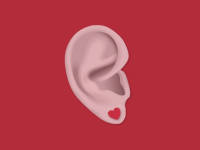Becoming a Listening Educator
The four traits of a listening educator are a willingness to slow down, genuine curiosity, attention to non-verbal cues, and self-awareness and empathy.
On the fourth day of his ninth-grade year, my student James unraveled. Our advisory class was deep into a week of community-building activities when another student said something that triggered him, and James erupted, "I can't be here any more! This is stupid!" His chest heaved with shallow breaths as he knocked over a chair and then stormed out. My colleague Lance and I faced a room full of wide-eyed 14-year-olds.
At lunchtime, we sat with James who by now had calmed down and looked more sullen than angry. As we listened, he shared that he had been in and out of group homes for ten years. His latest home was stable but emotionally sterile -- it felt like he checked into a hotel each day. "I haven't had a real family in years," James whispered, his eyes downcast. "For me, school is my family, and you guys are more than just my teachers." For the next few years, Lance and I watched out for James, supporting one another to be something in between "parent" and "teacher."
Looking back, I realize that James offered us an incredible gift that day: the opportunity to listen. I now see listening as the hallmark of the transformational educator.
Four Traits of the Listening Educator
Listening educators cultivate these simple powerful approaches.
1. The Willingness to Slow Down
The listening educator feels the urgency of change, but embraces the slower pace of listening. As a principal, I learned this lesson the hard way when a parent stopped me in the halls one day and said, "You always look so busy. You're marching through the halls getting things done, and I feel like you hardly see me when I walk by." What a wake-up call! From that moment on, I made a concerted effort to slow my stride, notice when a community member approached me, and set aside my current agenda to practice listening.
2. Genuine Curiosity
People and their stories fascinate the listening educator. Each interaction offers a riveting window into another human being's perspective and experience. To cultivate curiosity, develop a toolkit of authentic, open-ended questions. Here are a few that I ask often:
- What are your hopes and dreams (for yourself, your child, our school)?
- What one or two core values drive you to do what you do every day?
- What change would you like to see in our community, and what can you do to promote that change?
As you ask these probing questions and slow down to be fully present for the response, you build new muscle as a listener.
3. Attention to Non-Verbal Cues
The listening educator pays close attention to non-verbal communication. My friend Rachel worried when her bright, quiet son Gabriel entered kindergarten last year. She imagined that he would fade into the background and be invisible to his teacher, but instead he landed under the wing of a listening educator who studied his subtle cues. One day, the teacher noticed that Gabe's face had fallen and took him aside to find out what was wrong. Talking with Rachel, the teacher shared, "Yesterday, I noticed a change in Gabe's facial expression and discovered that he was worried the other kids could see a prize he had hidden for our class treasure hunt. Once we spoke, he felt better and came back to the lesson." Rachel was deeply moved by the teacher's ability to "listen" to her son's facial expression in the middle of a bustling kindergarten class.
4. Self-Awareness and Empathy
The listening educator cultivates self-awareness and empathy for others, especially in the face of challenging behavior. In moments of distress, we learn to ask ourselves, "What is coming up for me right now? Why am I being triggered by this behavior or person?" Empathy then offers a bridge to the other person's humanity, challenging us to stay present even when we want to run in the opposite direction. This requires courage, deep breaths, and a willingness to lean on our colleagues. Healthy adult communities adopt routines to facilitate peer support and build resilience. My later posts in this series will dig into such routines.
The Listening Educator and the Common Core
With the shift to the Common Core, educators can now choose to adopt a new mindset rooted in listening. Learning to listen well -- to our students, parents, colleagues, and communities -- will help us to build deeper relationships and to personalize support for every child.
Listening educators see the human experience as a complex text with listening as a form of close reading. They understand that every great lesson plan, parent conference, and teacher collaboration starts with a simple yet underutilized skill: listening. This is brave work that may not be rewarded in your evaluation, but it will exponentially increase your impact and set you apart as an educator.
Rewards for Listening
James graduated from June Jordan School for Equity in 2007. In his four years with us, he created a "home" filled with peers and educators who loved him -- people who saw him and really listened. I see James pop up on my Facebook screen from time to time, and I'm deeply thankful for what he taught me.
How do you listen to students, colleagues, and families? What does it mean to you to become a listening educator? Which of the four traits mentioned above do you struggle with, and which do you want to cultivate?
